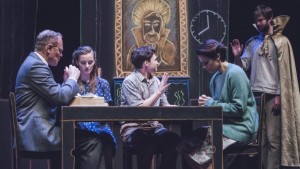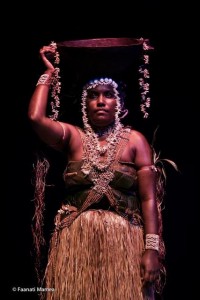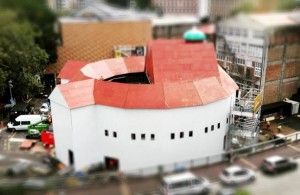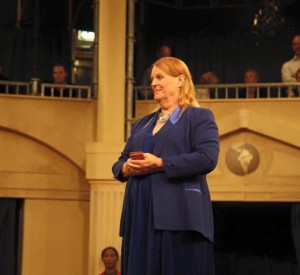
A recent conversation with my friend Stephen Fisher in Palmerston North included a discussion of The Book of Everything, adapted by Richard Tulloch from the novel by Netherlander, Guus Kuijer, and produced by Silo Theatre. I’d seen this excellent play back in February. Set in post war Amsterdam it’s about a young boy’s family experiences. A bullying father is trying to hold to his Christian disciplinary beliefs which are at odds with sensible child rearing and loving relationships. The next door neighbour branded a witch because she is different by the rest of the family, nevertheless becomes a fascination for the boy and eventually leads him to challenge his father, who is then redeemed. Ironically, the character of Jesus, who pops up in the boy’s head, is unable to provide any solutions.
I recommended that Stephen see the show when it came to Palmerston North, and I was quite relieved to hear that he had liked it. He didn’t however see the play in Palmerston North as the Regent Theatre asked him to review it in New Plymouth so there would have a better mid-week audience turn-out. It worked and the audiences came. Stephen and I then discussed the six million grant to Silo theatre for touring four North Island venues and was this pouring funds into Auckland Theatre to the detriment of Wellington Theatre?
Taking a deep breath, I pointed out that six million dollars wasn’t actually that much to tour a cast of eight, stage management, set and costumes to large scale venues (No 1 Tour in the UK) around New Zealand and that Kiwis often complain about everything being expensive – they don’t want to pay for quality. But on a really serious note, it does seem that Auckland Theatre is in the ascendancy now. Stephen felt that Auckland might have better actors – they’ve re-located now that Radio Drama has joined TV drama production in Auckland. I chipped in to say that historically, employers here refused to hire actors unless they were already living in the area. I found this to be the case in 1987 doing the audition rounds. Everyone asked, ‘how are you going to make a living when you are not acting?’ None of your business. ‘Where are you going to be based?’ I don’t know and does it matter? So it’s no wonder that the main centres still do not exchange artists and give their audiences some new faces from time to time.
There were plenty of new faces during the Festival this year and early on, deciding what to see, I eliminated all the One-person-shows. They seldom work for me and their proliferation is symptomatic both of the Kiwi ‘get up and give it a go’ mentality and the ‘we can’t afford to pay for more than one actor’ attitude. The result is a lack of real tension such as you would get in a dialogue between two actors. So, my first outing was a 2 pm matinee of Marama, Polynesian physical Theatre by Nina Nawalowalo at the large auditorium at Q Theatre. Marama employs six women performers plus two animators operating puppets and other effects.

It’s visually stunning, magical and slow, like the themes it embodies – climate change and deforestation in pacific Islands. There is a place in the forest where women can go and be safe, but that space is diminishing taking with it cultural values and a way of life. Out of the stage mist and darkness, women emerge from the forest floor; objects magically appear and recede back into the void. I know it’s done with the armoury of theatrical tricks, but don’t want to dwell on the technicalities, just enjoy the magic. It’s a visual treat for those with a good attention span and not in need of an afternoon nap as the gentle music and Waiata (song) is rhythmic and lulling.
Always keen to see what New Zealand playwrights are up to, I managed to squeeze in two of the four Raw performances. These are works in progress shown to a live audience for the first time. Making the most of my ferry journey from Waiheke, I’d managed to swim at Newmarket then a cycle up and over to Q theatre in Queen Street. Waiting to go into Cell Fish, I found myself half recognising Murray Lynch. We’d been at Massey University together in a drama course and at the time, I’d been envious of him running off to join a professional theatre company – something I managed to do three years later. Cell Fish, devised, written and performed by Miriama McDowell and Rob Makaraka – direction by Jason Te Kare – is centred around Miriama’s experiences teaching Shakespeare to Maori men in prisons. The two actors play all the characters in the prison drama group, often swapping roles. The result – partly in Te Reo – is often hilarious, but there is a serious message to be had from these damaged characters who may or may not be rehabilitated to the ‘outside’. We got act one, so this is one to watch as it develops. Murray and I had forty years of catching up to do over a drink in the bar waiting for the next show. Murray now runs Playmarket – unique in the world as the only organisation that works as a playwright’s agency and library/archive, actively developing new work.

Tea by Sri Lankan Kiwi, Ahi Karunaharan had a cast of fifteen. Set against the backdrop of the history of tea, its colonial plantations in what was then Ceylon, the struggles for worker’s rights and conditions plus women’s emancipation, Tea tells an epic story. I was unsure about the first scene which seemed to be between god-like beings, but as we were presented with only act one, I’m sure this will become clear. I was quickly drawn into the narrative of the different characters and look forward to the spectacle of so many South Asian actors in employment. Ahi was the producer of the Short & Sweet Festival last year and was a great help to me, so it was good to briefly hug and say ‘Hi’, after the show. My fold-up bicycle was waiting for me, tied to a balustrade in the Q Theatre Foyer. It was bliss riding down Queen Street to catch the ferry.

Not part of the Auckland Festival, but very much in the centre of theatre-land is the Pop-up Globe Theatre, erected with scaffolding and corrugated iron (Kiwi iconic building material) in the car park to the rear of Q Theatre and in front of the Basement (Fringe venue). Celebrating the 400 years of Shakespeare, it offers a resident company plus guest companies presenting plays plus workshops and schools matinees throughout March. There has been much chatter about competition for audiences with the Festival and the added complication of the Biennial NZ Festival in Wellington covering similar dates. My choice of Henry V was entirely due to the fact that Lexie Matheson was making her first stage appearance since transitioning to female fifteen years ago. We’d worked together at Theatre Corporate in 1977 and it was fantastic to reconnect.

In this all female production, Lexie played Alice, the French maid like a grand, but kindly duchess with a sense of humour. Lexie was a centred planet around which the delicate Princess of France flitted and her hat in the final scene was a triumph. It occurred to me that I’ve not actually seen a live production of Henry V before though I’ve studied the play and used one of the Chorus speeches for drama school auditions. It was disappointing, therefore to find the acoustics of the Pop-up Globe less than ideal. Sitting to one side, it was difficult to hear the softer unsupported voices of this young ensemble unless they were facing in my direction. Within this corrugated iron ‘O’, the sound does not bounce around the auditorium as it does in the wooden Bankside reconstruction. Ironically, the groundlings got the best sound here. The cast were nevertheless, valiant with particularly fine performances from the Eponymous hero (ine) and opponent Dauphin, although I could have done with less macho pacing up and down and around the stage. Also worthy of note was the hilarious Fluellen forcing the rascal Pistol to actually eat a leek – drawing a round of applause. With an eye on the ferry timetable, I was able to extricate myself from the after-show melee, but had to run down Queen Street. The bus ahead of me kept stopping, spurring me on, but I never quite managed to catch it. Fortunately the 10.15 sailing was late arriving.
Next time: The James Plays from The National Theatre of Scotland and Nixon in China